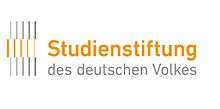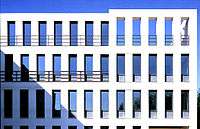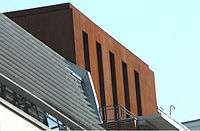Studienstiftung

The German Academic Scholarship Foundation (German: Studienstiftung des deutschen Volkes, or Studienstiftung for short) awards scholarship to exceptionally talented students and doctoral candidates in Germany. The Studienstiftung is non-political, non-denominational and ideologically independent. Its headquarters are located in Bonn; it also has an office in Berlin. The current President is Reinhard Zimmermann.
The Studienstiftung is funded by the federal government of Germany, the German federal states and local authorities, a large number of foundations and businesses as well as numerous private donors.[1] In 2015, the Studienstiftung's budget was over €103 million. Since its foundation, it has supported over 65,000 students and doctoral candidates; it currently has over 60,000 alumni worldwide.[2]


History
Initially founded in Dresden in 1925 as a department of the Deutsche Studentenschaft, an amalgamation of German student committees, the Studienstiftung des Deutschen Volkes was dissolved in 1934 under National Socialism and replaced by the "Reichsförderung", a department of the newly founded Reichsstudentenwerk. The Studienstiftung des deutschen Volkes was newly formed as a registered association in Cologne in 1948. As well as offering scholarship programmes on a national level, since 2005 the Studienstiftung has also run the Max Weber Programme, which supports exceptionally talented students within the framework of the Bavarian Elite Support Act (BayEFG).
Admission
The German Academic Scholarship Foundation supports exceptionally talented students and doctoral candidates selected in accordance with its mission statement, which is based upon the principles of achievement, initiative and responsibility. Scholars are admitted through various channels:
- Nomination by a school:: The principal of a high school or school with an upper secondary level can nominate one in 50 senior students for admission to the Studienstiftung. This student must excel both academically and in terms of social commitment. Nominated students attend a three-day selection seminar where their eligibility for funding is assessed in individual interviews and group discussions. 23.8% of students nominated in 2015 were offered admission to the Studienstiftung. There is no set admissions quota for the number of students admitted each year.
- Nomination by professors: Students at universities and universities of applied science can be nominated directly by university teachers. Again, candidates attend a selection seminar. In 2015, 48.3% of students nominated by their professors were offered admission to the Studienstiftung.
- Nomination by an examination board: Just as students can be nominated by schools, one in every 50 students in the second academic year in his/her respective study programme can be nominated by universities and universities of applied science. The nomination must be supported by a professor. The selection seminar is organised along the same lines as the selection seminar for students nominated by schools. In this case, however, the candidate's proven academic achievements at university also carry weight. In 2015, 28.8% of nominees were offered admission.
- Winners of a national or federal competition or nomination by select cooperation partners: Winners of or participants in various competitions on a national, federal or international level (e.g. Bundeswettbewerb Informatik, Bundeswettbewerb Mathematik, Bundeswettbewerb Fremdsprachen, Jugend forscht, Jugend debattiert, Internationale Mathematik-Olympiade, Internationale Physik-Olympiade, Altsprachenwettbewerb des Landes Baden-Württemberg) may be offered admission to the Studienstiftung. Select cooperation partners (e.g. START-Stiftung) may also nominate potential sponsorship candidates.
- Since February 2010,[3] candidates can also put themselves forward for a scholarship. First and second-semester students can sign up for the Studienstiftung assessment test in January/February each year. The test is held at test centres throughout Germany. The applicants with the best results are invited to attend the selection seminar. While the assessment test determines applicants' cognitive abilities, the selection seminar focuses on motivation, extracurricular interests, social commitment and social skills, which are assessed in personal interviews and group discussions.
- Nomination by alumni: Studienstiftung alumni may also nominate students who they consider appropriate, having taught them personally in school or university courses.
- Support of musicians and artists: After an internal pre-selection procedure, universities can nominate students of the fine arts, music and the performing arts for participation in a Studienstiftung selection seminar.
- Doctoral sponsorship: Highly qualified and socially committed PhD students may, together with their supervisors, submit an application for support for their doctoral studies.
If admission occurs before the end of the fourth semester, sponsorship is usually granted until the end of the sixth semester. An extension of the scholarship beyond the sixth semester usually depends on academic performance in the first four semesters. In borderline cases, aspects other than academic achievements – such as exceptional social engagement or particular personal circumstances – may positively influence the decision to approve further funding. After an application has been approved, funding is awarded from the 6th semester until studies are completed (for example, until the master's degree or state examinations have been completed). In 2014, 91% of requests for further funding were approved.
Support
The Studienstiftung supports scholars both financially and academically.
Financial support
Financial support includes a study expense allowance (€300 month) and a need-based basic scholarship, which is calculated according to the BAföG (Federal Training Assistance Act) and can currently be up to 825 € per month. PhD students receive a monthly award of €1,250. Additional funds are provided for students and PhD students with children. Financial support is regulated by the guidelines of the German Ministry of Education and Research (BMBF). Visits abroad are also supported by grants or overseas allowances and the partial payment of tuition fees. Under the terms of No. 11 Einkommensteuergesetz (EStG – German Income Tax Law) scholarship payments are tax-free.
Academic support
The Studienstiftung's academic support includes summer academies, research groups, language courses, workshops and supervision by local tutors, who carry out this task for the Studienstiftung on a voluntary basis. Scholars are required to submit a report on their studies and other activities every semester during the first semesters (usually until the end of the fourth semester), and once a year thereafter. Grant holders can also apply for funding in order to organise their own conferences and other events.
Open scholarship programmes
In addition to its regular funding schemes, the Studienstiftung offers a number of specific scholarship programmes which are run and financed in cooperation with other organisations. The best known programmes are the McCloy Academic Scholarship Program, the ERP-Stipendienprogramm and the Carlo-Schmid-Programm.[5] Participation in these scholarship programmes does not require previous funding by the Studienstiftung.
The German Academic Scholarship Foundation statistics
- In 2015, the Studienstiftung approved 2,391 student grants and around 350 doctoral scholarships.
- In 2015, 65.2% of scholarship holders received a study expense allowance of €300, 21.3% received a partial scholarship and 13.5% a full scholarship:
- Over 90% of the German Academic Scholarship Foundation budget in 2015 was publicly funded.
- In recent years, the Studienstiftung has significantly increased the number of students from non-academic backgrounds and ethnic minorities: Currently 30% of scholarship holders come from non-academic backgrounds and 18% from an ethnic minority.
- 47.8% of scholarship holders with a student scholarship in 2015 were women, and women accounted for 57.3% of doctoral scholarships.
| Year | Funded students[4] | Number of students Germany[5][6] | ||
|---|---|---|---|---|
| Undergraduate and graduate scholars | Doctoral scholars | Total | ||
| 2005 | 6.966 | 993 | 7.959 | 1.985.765 |
| 2006 | 7.352 | 946 | 8.298 | 1.979.043 |
| 2007 | 8.438 | 1.080 | 9.518 | 1.941.405 |
| 2008 | 10.030 | 1.194 | 11.224 | 2.025.307 |
| 2009 | 11.482 | 1.211 | 12.693 | 2.121.178 |
| 2010 | 11.336 | 1.303 | 12.639 | 2.217.294 |
| 2011 | 11.123 | 1.350 | 12.473 | 2.380.974 |
| 2012 | 11.373 | 1.274 | 12.647 | 2.499.409 |
| 2013 | 11.195 | 1.273 | 12.468 | 2.613.168 |
| 2014 | 11.858 | 1.184 | 13.042 | 2.694.579 |
| 2015 | 12.158 | 1.141 | 13.299 | 2.755.408 |
| University | Students in winter semester 2014/2015 | Number of scholars (excluding doctoral scholars) | In % of all students |
|---|---|---|---|
| Bucerius Law School | 874 | 65 | 7,44 |
| Hertie School of Governance | 433 | 23 | 5,31 |
| Zeppelin Universität Friedrichshafen | 1.061 | 20 | 1,89 |
| Charité Berlin | 6.714 | 213 | 3,17 |
| Ruprecht-Karls-Universität Heidelberg | 29.761 | 633 | 2,13 |
| Albert-Ludwigs-Universität Freiburg | 24.286 | 383 | 1,58 |
| Universität Witten/Herdecke | 2.021 | 44 | 2,18 |
| Jacobs University Bremen | 1.101 | 14 | 1,27 |
| Universität Lübeck | 3.711 | 54 | 1,46 |
| Universität Mannheim | 11.922 | 155 | 1,30 |
| Medizinische Hochschule Hannover | 3.295 | 49 | 1,49 |
Notable alumni
Science
- Wolfgang Ketterle, Nobel prize physics 2001
- Erwin Neher, Nobel prize medicine 1991
- Robert Huber, Nobel prize chemistry 1988
- J. Hans D. Jensen, Nobel prize physics 1963
- Manfred Eigen, Nobel prize chemistry 1962, former president of the Studienstiftung (1982–1993)
- Gerd Faltings, mathematician, Fields medal 1986
- Heinrich Detering Leibniz prize 2009
- Martin R. Zirnbauer, mathematician, Leibniz prize 2009
- Martin Beneke, physicist, Leibniz prize 2008
- Wolfgang Lück, mathematician, Leibniz prize 2008
- Jochen Mannhart, physicist, Leibniz prize 2008
- Magdalena Götz, biologist, Leibniz prize 2007
- Oliver Primavesi, philologist, Leibniz prize 2007
- Detlef Weigel, biologist, Leibniz prize 2007
- Gyburg Radke, philologist, Leibniz prize 2006
- Albrecht Koschorke, German literature, Leibniz prize 2003
- Felix Otto, mathematician, Leibniz prize 2006
- Ulrich Beck, sociologist
- Christian Keysers, neuroscientist
- Ulrike Malmendier, economist
- Stephan Reimertz, art historian
- Ernst-Ludwig von Thadden, economist
- Dirk Kaesler, sociologist
- Ulrike Müßig, legal historian
- Reinhard Zimmermann, legal historian, Leibniz prize 1996
Business and NGOs
- Andreas von Bechtolsheim, co-founder Sun Microsystems
- Alexander Dibelius, Managing Director Germany, Goldman Sachs
- Frank Mattern, Head of the German Office, McKinsey and Company
- Wolfgang Bernhard, member of the Board of Management of Daimler AG
Public service
- Antje Vollmer, politician, until 2005 Vice-President of the German parliament
- Fritz Kuhn, politician, co-chairman of Bündnis 90/Die Grünen, the German Green Party, from June 2000 to December 2002
- Steffen Seibert, journalist, current Government Spokesman and Head of the Press and Information Office of Germany
- Gesine Schwan, professor, SPD-candidate for the office of the federal president, 2004
- Robert Tillmanns, politician
- Karl Schiller, politician and scientist
- Christine Teusch, politician
- Andreas Paulus, judge at the Federal Constitutional Court of Germany
Arts
- Hans-Jürgen von Bose, professor, composer
- Hans Breder, professor, artist
- Moritz Eggert, composer, pianist
- Hans Magnus Enzensberger, writer
- Justus Frantz, pianist
- Anna Gourari, pianist
- Horst Janssen, artist
- Bas Kast, writer
- Heinz Rudolf Kunze, singer and composer
- Michael Kunze, librettist and translator
- Frei Otto, architect
- Matthias Pintscher, composer
- Philipp Tingler, writer, journalist and economist
- Juli Zeh, writer
Journalism
- Petra Gerster, journalist
- Claus Kleber, journalist, anchor of the "heute-journal"
- Ulrike Meinhof, editor, subsequently member of the Red Army Faction (RAF)
- Frank Schirrmacher, journalist
See also
References
- ↑ yearly report
- ↑ http://www.studienstiftung.de/daten.html
- ↑ "Aktuelles - Neuer Auswahltest der Studienstiftung". www.studienstiftung.de. Retrieved 2016-06-27.
- ↑ "Funded in degree and doctorate." (PDF 4,35 MB) (in German). p. 240. Retrieved 2016-01-15.
- ↑ "Number of students in Germany - Total" (in German). Retrieved 2014-03-15.
- ↑ students. by provinces and deeper structured information
- ↑ Number of students and Studienstiftung scholars at German universities
Literatur
- Anant Agarwala: Wie sich die Stipendiaten der Studienstiftung ändern. Die Spitze wird bunter, in: Die Zeit 21/2016.
- Annette Julius: Vielfalt als Ressource – Programme und Maßnahmen der Studienstiftung im Hinblick auf unterrepräsentierte Gruppen. Beitrag zu den Ergebnissen der 2011/2012 durchgeführten Evaluierung der Auswahlverfahren der Studienstiftung, Bonn 2014.
- Annette Julius: Persönlichkeiten fördern, in: Roth, Gerhard / Hartung, Manuel (Hg.): Ressource Begabung: Wie kann Deutschland sein Potenzial besser nutzen?. Berlin University Press, 2013, S. 112 - 126.
- Rolf-Ulrich Kunze: Die Studienstiftung des deutschen Volkes seit 1925. Zur Geschichte der Hochbegabtenförderung in Deutschland. Akademie-Verlag, Berlin 2001, ISBN 3-05-003638-9.
- Thomas Ludwig: „Studenten sind nicht mehr Kinder reicher Leute.“ Die soziale Struktur der Studienstiftung seit 1925, in: Jahresbericht der Studienstiftung 2009, S. 105-121.
- Thomas Röbke: Mit besten Empfehlungen: Wer ein Stipendium der Studienstiftung des deutschen Volkes ergattert, ist fein raus – doch was tun, wenn niemand einen vorschlägt? In: Die Zeit. Nr. 33/2002.
- Zentrum für Evaluation und Methoden (ZEM) der Universität Bonn: Evaluierung des Auswahlverfahrens der Studienstiftung des deutschen Volkes e.V., Bonn 2012.
Studienstiftung und Zeitgeschichte
- Nik Afanasjew: RAF und die Studienstiftung: Aus Stipendiaten wurden Terroristen. In: Der Tagesspiegel. 3. Oktober 2011.
External links
- Homepage of the Studienstiftung:Studienstiftung des deutschen Volkes
- Alumni der Studienstiftung e.V.
- Selbstbewerbung für ein Stipendium